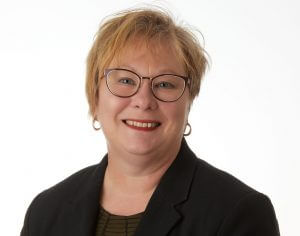 Sherry Valley, Senior Commercial Lender, has been making business loans throughout her 30-year banking career, and that experience has taught her a few things.
Sherry Valley, Senior Commercial Lender, has been making business loans throughout her 30-year banking career, and that experience has taught her a few things.
“Doing this work during the pandemic, when everything was virtual for months, was challenging,” Sherry explained. “But aside from those months, the first thing I do with a potential borrower is to sit down face-to-face and listen. You can really gauge the passion someone has for their business by hearing them discuss their business plan and by simply observing their body language. It tells me so much about their passion and interest in making the business succeed.”
Sherry will ask about the business’s short-term and long-term plans as well as the owner’s goals: what do they want to achieve, and what is their five-year vision for the business? The next questions are about money: how much do they need, and how much will they bring to the table?
“In the process of learning about the business, I end up developing rapport and relationships with these folks,” said Sherry. “I’ve developed many lifelong customers because of the way I go about learning and listening. I show genuine interest in them as people, and they respect and respond to that.”
The second step of Sherry’s process of evaluating the bank’s risks associated with the potential loan is to visit the business, assuming there is an existing place of business and it’s not a start-up, for example.
“Sometimes I am on site for our first conversation, too,” said Sherry, “but it’s never later than our second conversation. Seeing the operation, seeing the equipment, seeing the staff, seeing the whole thing—I learn so much in that visit. You can tell very quickly if the people working there are happy and excited or simply going through the motions. That tells me a lot about what type of business this person operates, and that gives me a sense of the likelihood the loan will be repaid.”
One of Sherry’s first banking jobs was lender’s assistant, and she listened and watched as the lender met with customers. Sherry has perfected the craft over the years in her work with scores of start-ups as well as established companies.
“It’s important that lenders understand the business enough to ask about pitfalls the owner may encounter,” Sherry continued. “If the owner is unaware or never mentions any concerns they have, that’s a red flag. With start-ups, many times the owners don’t know what they don’t know, so I try to help them walk through various scenarios to see how much they’ve thought things through.”
Sherry believes it is simple job preservation for her to be as diligent as possible in the process of evaluating these loan applications. “One of the first training courses I took in credit management was from a gruff, old-fashioned banker. His advice: if you’re going to do a good job, you need to be 99.99% sure–all the time! That was pretty daunting. I realize that in my professional role, I’m working with someone else’s money, not my own. I need to be careful that I am doing my very best in sizing up the business’s potential and risks.”
Sherry noted that she and other bankers don’t want to tell people ‘no,’ but sometimes ‘no’ is the right answer. “I’ve done my share of telling people ‘no,’” said Sherry, “but if I’m thorough and explain why it is “no”, I believe I can preserve the relationship with that person. Sometimes those borrowers return and resubmit another application that will result in a stronger business with lasting success. Ultimately, I’m protecting the bank, the customer and myself.”